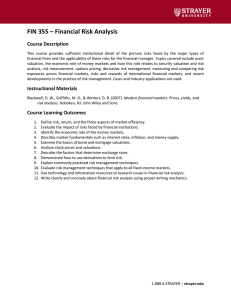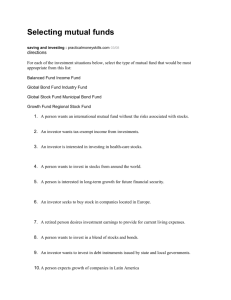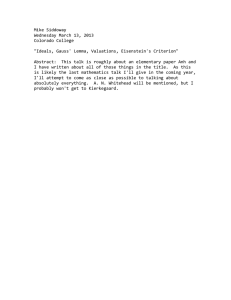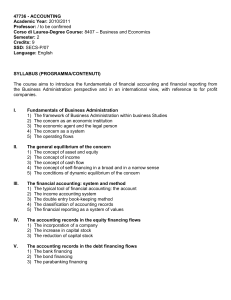✯ 2003 National Health Policy ... January 22-23, 2003 J.W. Marriott
advertisement
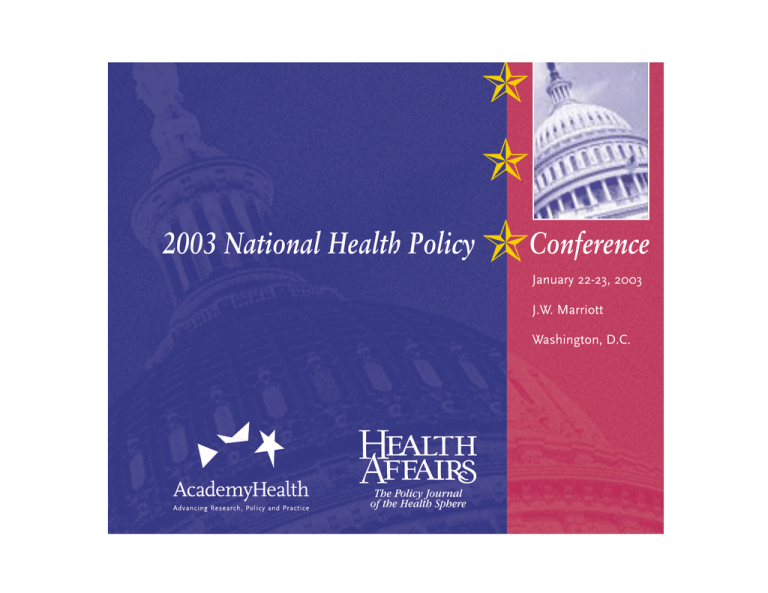
✯ ✯ 2003 National Health Policy ✯Conference January 22-23, 2003 J.W. Marriott Washington, D.C. National Health Policy Conference January 22, 2003 A.J. Rice Merrill Lynch Outlook- Will “More of the Same” Be Enough? 1) Tenet’s problems have rekindled old fears about the group (i.e. that positive fundamentals can change abruptly); 2) Excluding company-specific issues, fundamentals generally remain positive: z z Medicare Reimbursement Backdrop Stable, z z Commercial Pricing Remains Strong, z z Volume Gains Offer Potential Positive Surprise, z z Acquisition/Consolidation Activity Robust, and z z Tightening Supply/Demand A Long-Term Positive; 3) Meanwhile, valuations have returned to well below average; 4) In midst of sluggish economic rebound, quality providers should still outperform broad market (S&P 500). Current Hospital Stock Investment Cycle 80% 60% 40% Hospitals 20% S&P 500 0% -20% 2001 2000 -40% •Initial investor buy-in that recovery underway -60% 2nd Half 1999 1998- 1st Half 1999 •Lessening investor interest •Downward estimate revisions •Declining valuations •Regulatory Scrutiny at its height •Investor Capitulation •Earnings Bottoming •Trough Valuations •BBRA Passes 11/99 •Stocks perceived to be attractive by value investors •Benefits of BBRA begin •Earnings stabilize and positive surprises begin •2nd relief package (BIPA) passes in December •Stocks consolidate as incremental investor shifts to growth from value •Fed cuts rates in Jan. •Investor opinion diverges regarding economic outlook 2002 •After three quarters of outperformance versus the broad market, news from Tenet and Province push share prices down. •Companies continue to meet •Positive earnings trends continue and beat estimates •Valuations fall back below •Valuations fluctuate and historic average volatility increases •Stocks end year cheaper than they started 2003 - ? •Investors regain confidence in names •Positive earnings trends Companies continue to meet and beat estimates •Valuations return to historic average •Wider investor participation in sector Hospital Group Always Has its Challenges Major Perceived Challenges Relate Principally to Government Issues Perception that Washington reimbursement environment may worsen given re-emergence of federal budget deficit Regulatory backdrop could also worsen because of Tenet Medicare outlier controversy Re-emergence of adverse media scrutiny and focus Medical malpractice-related concerns/headlines Federal Trade Commission review of hospital mergers Many Not-For-Profits Lack Access To Capital Moody’s NFP Hospital Debt Changes 70 60 Upgraded Downgraded 50 40 30 20 10 0 1991 1992 1993 1994 1995 1996 1997 1998 1999 2000 2001 2002 “A “A decade decade from from now, now, itit would would not not be be surprising surprising ifif all all non-profit non-profit hospitals, hospitals, except except those those with with generous generous patrons patrons or or unusually unusually competent competent management, management, were were closed closed or or sold.”– sold.”– The The Economist; Economist; January January 27, 27, 2001 2001 Source: Source: The The Economist; Economist; January January 27, 27, 2001. 2001. Relative P/E Average 12/01/02 09/02/02 06/02/02 03/02/02 12/01/02 09/01/02 06/01/02 03/01/02 12/01/00 09/01/00 06/01/00 03/01/00 12/01/99 09/01/99 06/01/99 03/01/99 12/01/98 09/01/98 06/01/98 03/01/98 12/01/97 09/01/97 06/01/97 03/01/97 12/01/96 09/01/96 For-Profit Hospital Stock Valuations Highly Volatile (P/E Relative to S&P 500) 1.80 1.35 0.90 0.45 Hospitals Have Outperformed Over The LongTerm 900 800 700 600 500 400 300 200 100 S&P 500 Hospitals 11/30/02 07/18/01 03/05/00 10/22/98 06/09/97 01/26/96 09/13/94 05/01/93 (100) 12/18/91 0 “Sometimes things don’t work as expected.” National Health Policy Conference January 22, 2003 A.J. Rice Merrill Lynch


